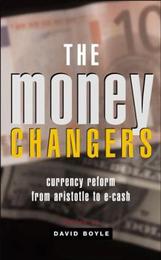
|
The Money Changers: Currency Reform from Aristotle to e-Cash
Hardback
Main Details
| Title |
The Money Changers: Currency Reform from Aristotle to e-Cash
|
| Authors and Contributors |
Edited by David Boyle
|
| Physical Properties |
| Format:Hardback | | Pages:288 | | Dimensions(mm): Height 216,Width 138 |
|
| Category/Genre | Economic theory and philosophy |
|---|
| ISBN/Barcode |
9781853838958
|
| Classifications | Dewey:332.4 |
|---|
| Audience | | Undergraduate | | Postgraduate, Research & Scholarly | | Professional & Vocational | | General | |
|---|
| Illustrations |
Bibliography, index
|
|
Publishing Details |
| Publisher |
Taylor & Francis Ltd
|
| Imprint |
Earthscan Ltd
|
| Publication Date |
1 December 2002 |
| Publication Country |
United Kingdom
|
Description
Since money was invented, there has been a debate about better ways of creating it and better rules to govern how it works - until the last generation, when it began to seem that the money system had been handed down by God and remained unchanged ever since. But the last few years have seen an increasingly powerful resurgence of interest in changing the system fundamentally, and bringing the monetary trends that affect all our lives under our control. Few realize that the debate has roots and a tradition, covering mainstream economists like Keynes and Hayek, statesmen like Lincoln, entrepreneurs like Ford and Soros, as well as the imaginative mavericks behind local currencies and e-money. This volume collects together some of their most influential writings to provide a handbook on a vital train of ideas, and a guide to a debate on changing money that is becoming increasingly important.
Author Biography
David Boyle is a senior associate at the New Economics Foundation in London and is the author of Funny Money (1999) and The Tyranny of Numbers (2001).
Reviews'Lively and illuminating.' Future Survey 'Boyle's fascinating book collates a range of key economic thinkers' arguments, from the historical to the present day, and analyses their work in a unique discourse.' The Ecologist 'A unique collection of historical and contemporary thought on the nature of money combines the political and polemical, the analytical and visionary, and draws on a wealth of expertise and experience from the early reformsers to modern critics such as Keynes and Hayek.' Book Notes. Business Horizons 4 July- August 2004
|